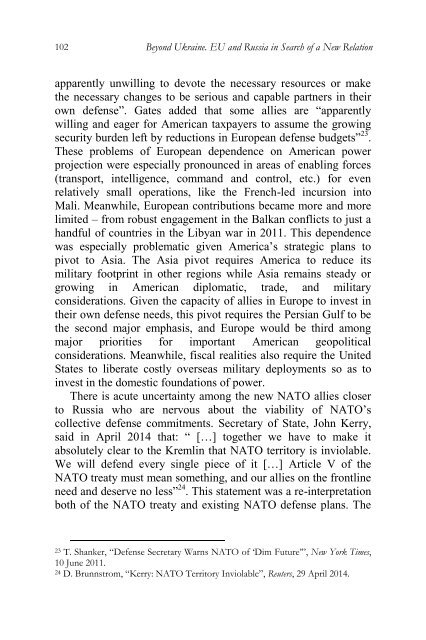beyondukraine.euandrussiainsearchofanewrelation
beyondukraine.euandrussiainsearchofanewrelation
beyondukraine.euandrussiainsearchofanewrelation
You also want an ePaper? Increase the reach of your titles
YUMPU automatically turns print PDFs into web optimized ePapers that Google loves.
102 Beyond Ukraine. EU and Russia in Search of a New Relation<br />
apparently unwilling to devote the necessary resources or make<br />
the necessary changes to be serious and capable partners in their<br />
own defense”. Gates added that some allies are “apparently<br />
willing and eager for American taxpayers to assume the growing<br />
security burden left by reductions in European defense budgets” 23 .<br />
These problems of European dependence on American power<br />
projection were especially pronounced in areas of enabling forces<br />
(transport, intelligence, command and control, etc.) for even<br />
relatively small operations, like the French-led incursion into<br />
Mali. Meanwhile, European contributions became more and more<br />
limited – from robust engagement in the Balkan conflicts to just a<br />
handful of countries in the Libyan war in 2011. This dependence<br />
was especially problematic given America’s strategic plans to<br />
pivot to Asia. The Asia pivot requires America to reduce its<br />
military footprint in other regions while Asia remains steady or<br />
growing in American diplomatic, trade, and military<br />
considerations. Given the capacity of allies in Europe to invest in<br />
their own defense needs, this pivot requires the Persian Gulf to be<br />
the second major emphasis, and Europe would be third among<br />
major priorities for important American geopolitical<br />
considerations. Meanwhile, fiscal realities also require the United<br />
States to liberate costly overseas military deployments so as to<br />
invest in the domestic foundations of power.<br />
There is acute uncertainty among the new NATO allies closer<br />
to Russia who are nervous about the viability of NATO’s<br />
collective defense commitments. Secretary of State, John Kerry,<br />
said in April 2014 that: “ […] together we have to make it<br />
absolutely clear to the Kremlin that NATO territory is inviolable.<br />
We will defend every single piece of it […] Article V of the<br />
NATO treaty must mean something, and our allies on the frontline<br />
need and deserve no less” 24 . This statement was a re-interpretation<br />
both of the NATO treaty and existing NATO defense plans. The<br />
23 T. Shanker, “Defense Secretary Warns NATO of ‘Dim Future’”, New York Times,<br />
10 June 2011.<br />
24 D. Brunnstrom, “Kerry: NATO Territory Inviolable”, Reuters, 29 April 2014.


